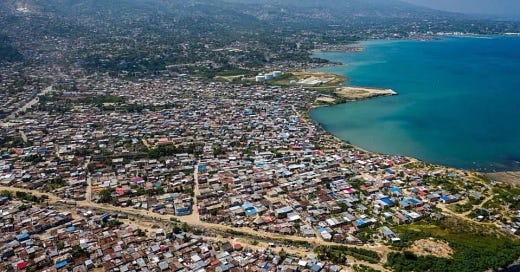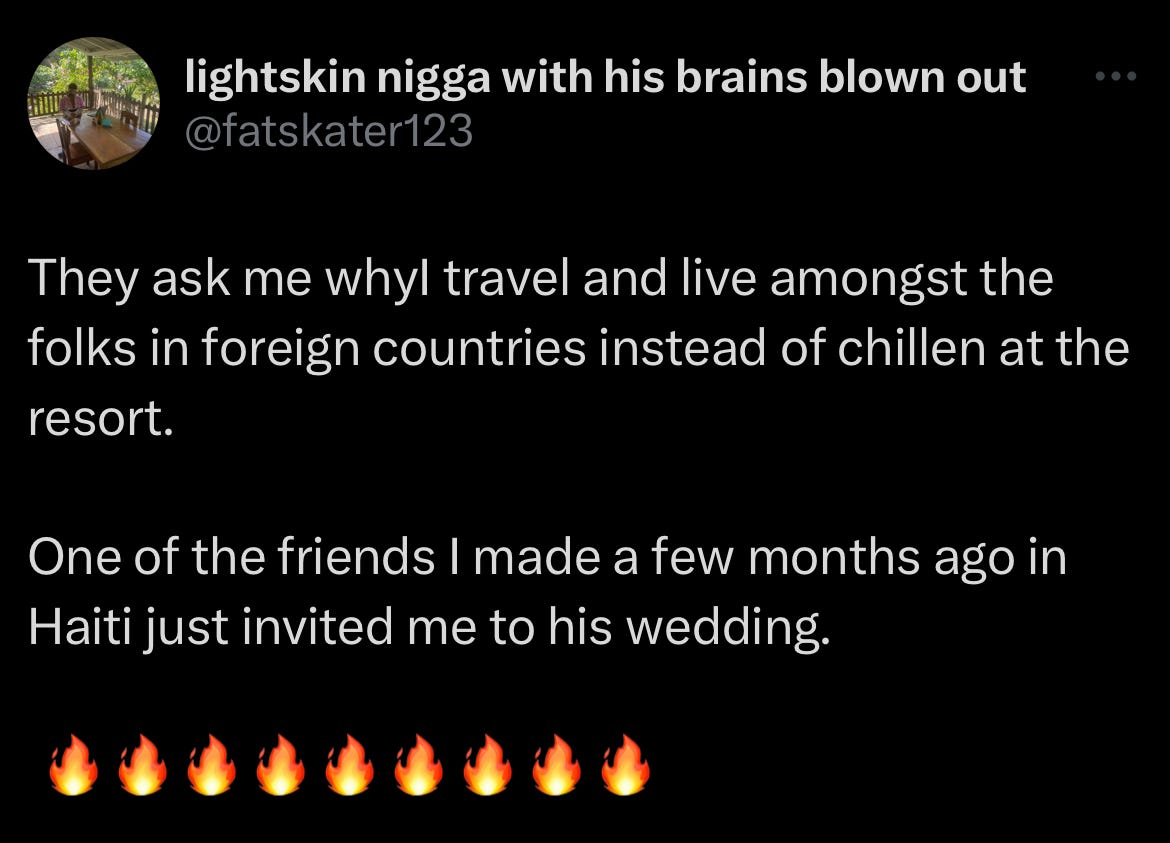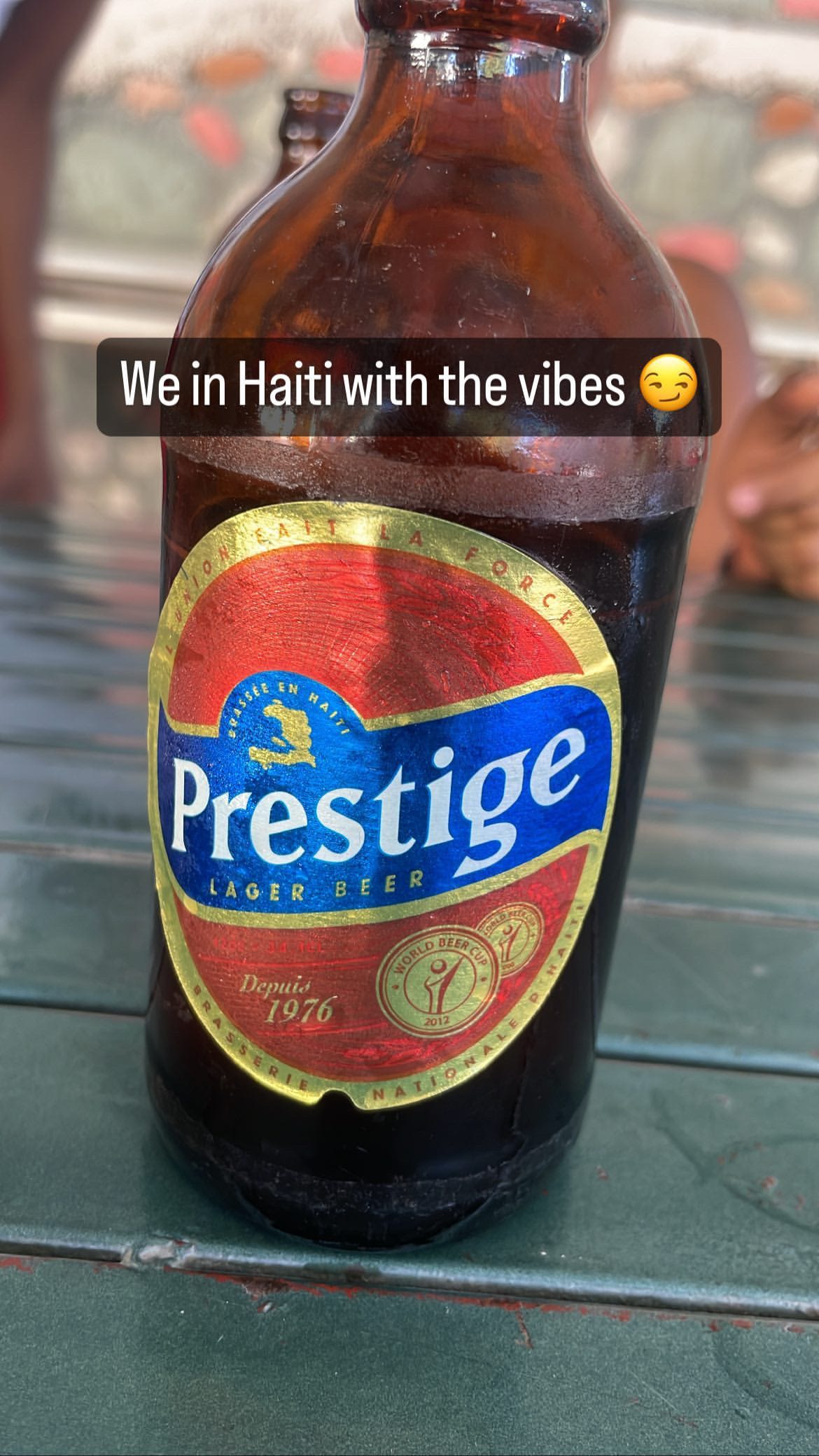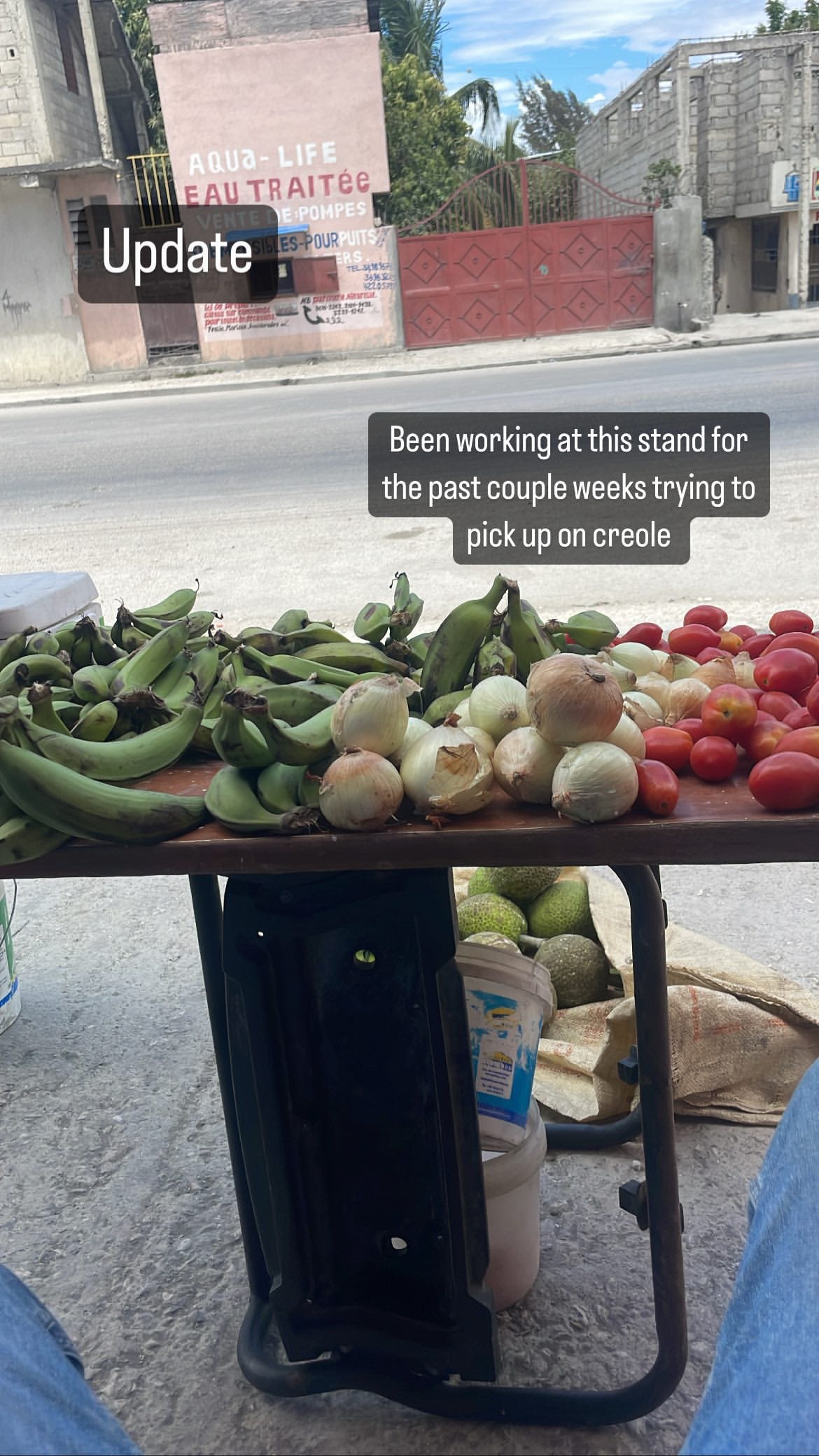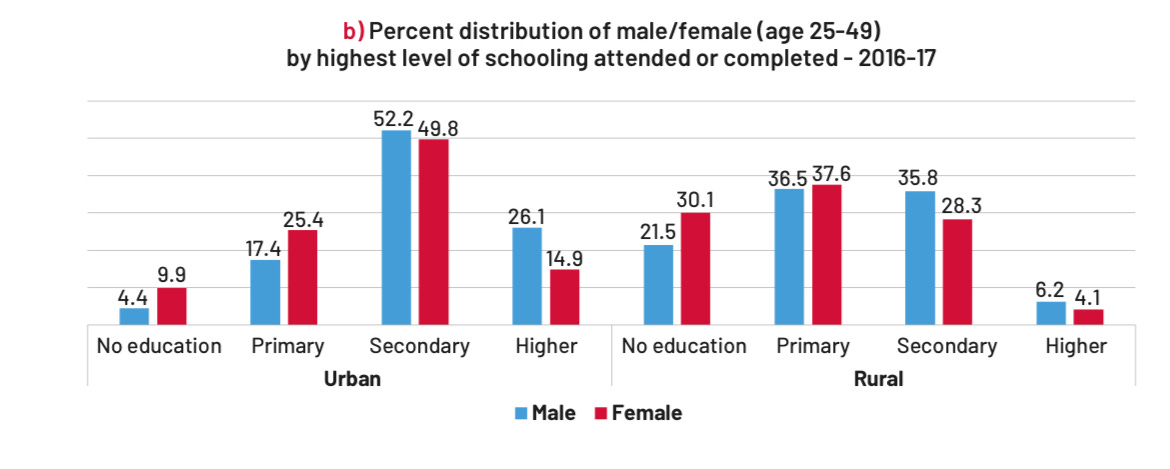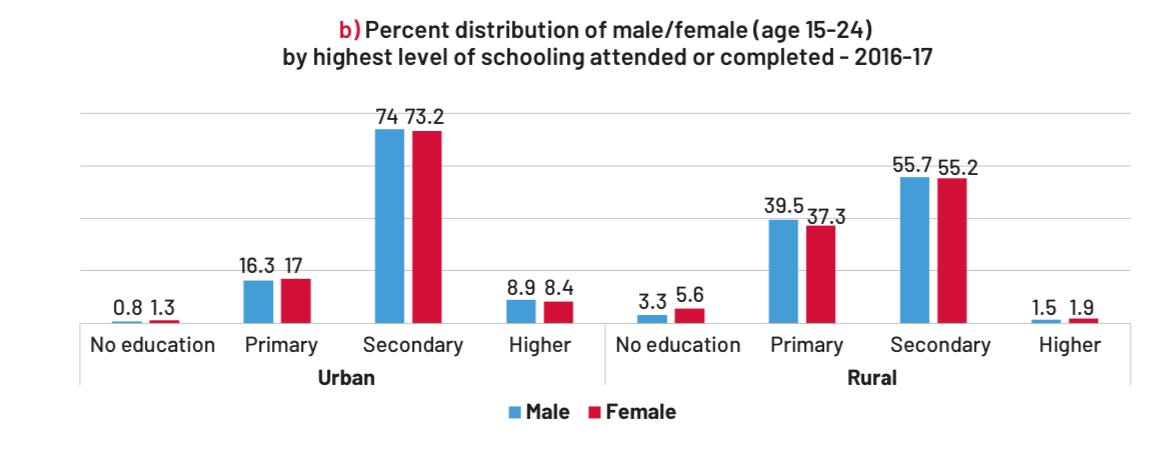This Newsletter has been taken from my correspondence with a friend of mine. Certain things have been left out and changed for the sake of creating a cohesive and coherent article and to grant her anonymity. This week’s issue is based on my time in Haiti. A place I am very fond of and in my opinion one of the highlights of my travels. I got to go to a place many would never travel to and got to meet people that opened up my mind in a way I don't think could have been opened if not for going there.
First off I would like to give a thank you to all of the people I met in Haiti that looked out for me. Countless people, I met countless good hearted people. Some of the most incredible people I have met, speaking three, maybe even four languages. I would sit down and have some of the most complex conversations on any given topic. There is an understanding in Haiti about the truths of colonization that I did not see in other countries with any other people beside certain groups I associate with in the United States.
People read the news and think Haiti is completely quagmire and that there is no habitable place to live there. Although it is torn apart in unimaginable ways, people still live there, people have families there, people have businesses there. People attend colleges there and do the unimaginable to people outside of Haiti that only get their information from the mainstream news. People have lovers and romance, parties and gatherings, almost any and everything you can think of. By the end of my first week there, I was traveling around Port-au-Prince without any guidance or any worries. Trauma porn has warped not only the way we intake information, but also the way information is given to us. The news reports the most horrific stuff over and over again because that is what keeps the lights on at the network.
I don’t emphasize these things to come across as surprised or shocked. I was always skeptical of the way the news in the US reports on anything, but I want to make it clear, what you may imagine Haiti to be is not the full story or picture.
A Place for the Curious Foodie
If you ever do end up in Haiti, I will say the food is fabulous, if you can get your hands on a meal. Many places are abandoned so you have to learn where the food spots are or take the gamble and take a stroll in an area that you are not particularly familiar with. The national beer there ,Prestige, is one the best beers I have tasted anywhere in my life. It tastes as if beer were a fruit and you could pick the bottle from a tree and drink it. They have their own version of macaroni and cheese that has more of a lasagna vibe to it and it is perfect. It is definitely a good, but risky destination for the curious food lover. Any given day I could be caught out in the street looking for new places to find a meal. My stomach has lead me to travel all over Port-au-Prince. The street food in Haiti tastes as good as if you went to someones house for a home cooked meal and the aroma can be smelled from down the block. My go to was a grilled chicken quarter with cabbage and rice and beans. Have that with a bottle of Prestige and you are good to go.
How I Spent My Time
Now, because there was no gym to train at and I was getting bored with not much to do (things are very limited there in terms of recreation) I began to run a fruit and vegetable stand outside of the place I was staying at. It belonged to the family that took care of the home I was staying at and they lived there for free in return (they were not paid, I will get back to that later). So this fruit stand was their only source of income and being able to participate in that with them was a beautiful thing. This is how I got to know a lot of the locals and become a familiar face in the area very quickly (also, I stood out for being light skinned as well). I would spend full days chit chatting and trying my hardest at Haitian creole.
Towards the end of my stay I really got to know the people more intimately when the communal water pump across the street broke and everyone came to where I was staying because we had a well in our yard. I would bale the water out of the well and carry the 5 gallon buckets to people's homes for hours out of the day. It was considered a woman’s job to fetch the water and you could tell because most of the women were built like professional athletes from carrying those buckets daily to their home. Through carrying these buckets I got to meet whole families and have conversations I did not think I would have. Also it was a good workout.
Living Conditions
Okay, firstly it is obvious upon arrival in Haiti that it is insanely poverty stricken. It is the poorest country in the western hemisphere and going through some of the biggest political turmoil in the history of the nation. A few years ago the president was assassinated and the streets have been taken over by gangs of teenagers with heavy military grade arsenals. I remember the first time I was walking alone and saw a child no older than 14 with a brand new shiny blue steel assault rifle on the back of a motorcycle. I wondered where a child in one of the poorest countries in the world could get a gun worth hundreds, if not thousands of dollars USD. The only thing I can think of, and it is only a theory, is that gun manufacturers from the US, Russia, China, Israel, etc. have such a surplus of weapons that they have to get rid of some of them by smuggling them to certain places around the world to keep the price of weapons at a certain cost. With the history of Haiti and its French debt that was later handed over to the United States it only seems fitting that at least US manufactures would have a hand in supplying guns to Haitian gangsters indirectly to keep the country from getting better because of the turmoil these arms cause. Directly extending the amount of time the country will need to pay the US back because of the turmoil they have to deal with, causing them to be in the US’s debt longer. I don’t know, call me a conspiracy theorist. Check this out for more information: “Anger grows in Haiti over weapons trafficking from U.S. after guns shipped as church donations”
Haiti started out as a French colony and although right next to DR it had a different fate than DR. At the time of colonialism for what I understand Spain was pretty poor and could not keep up with its slave trade in the Americas as much as the other countries involved in the trade, but on the other side of Hispaniola in Haiti, France was strong in what they could financially do and get away with. This leads to the next thing that is wrong in Haiti. The French are a very small but very powerful population there. When going into what would be considered a “nice” “upscale” establishment it is almost guaranteed to be run by a white Frenchman who was born and raised in France and moved to Haiti for, let's just say business purposes, EXPLOITATION OF THE HAITIAN PEOPLE. This, like in The Bahamas leads some to aspire to be white, a kin to whiteness or at least once they start to make some sort of income of abundance, become a monster to their fellow man. Next door to me I befriended a woman by the name of Widline. She, like the family I stayed with, would sell things to make money, but also she would take care of the mansion next door that had an owner that I never met because he escaped to a safer part of the country because of the apparent danger of the area we were in. Yet, did you know he had two women, Wideline and another, working on his grounds taking care of his dogs and his home, but would not let them stay in said home. He put them in small tin shacks next to his massive mansion. Same with where I stayed. The family would work their ass off for their family members estate, but would not get paid a dime for their labor besides what I paid them. This would happen all while the estate owner, their sister, would bank the profits in the United States.
The Education Gap & Holding onto Gender norms
For what I said earlier about the conversations I had with people being very complex and progressive in nature, I was referring mostly to the men I interacted with, as opposed to the women. The deeper conversations I had with women there were often more conservative and were sometimes bordering on bigotry. It was not uncommon to come across conversations where women would gladly spew the idea of “knowing a woman’s place” and what have you. I have my ideas on why that is. Firstly, the most obvious, men were more likely to attend college or higher education than their female counterparts up until recently in Haiti. The gap has closed in recent times, but you can still feel and see the effects of the gender gap in higher education.
Information pulled from World Bank
The first graph is a representation of people ages (25-49) and their level of education obtained. The second graph shows a younger demographic of people (15-24) and their level of education.
*Note that the drop off in the second graph is not because of an overall decline in higher learning, but rather it comes from a pool with half of its data not old enough to attend university yet.
With this statistic we can see that men have had a better chance of obtaining knowledge on race, sex and other intersections, due to obvious reasons of college being an opportunity to be in leftist spaces and hear radical viewpoints first hand.
This is not to say that higher education rules over the lived experiences of Haitian women and men who have not obtained higher learning. On the contrary the person with lived experience will always know more than the person simply studying said experience, but someone who lives an experience and then obtains higher learning and gains the knowledge to fully understand his or her circumstances, that person will be able to articulate their experiences and understanding of the world in a much more clear way. They will be able to analyze their experiences in a much better way, because of the mental tools they picked up in college.
The next thing that I think leads the woman, at least the ones I interacted with, to have these more conservative viewpoints is that we have to look at their intersections and see how it is much different there than in the US. In Haiti being a black person is almost secondary to your identity, because everyone else around you is also black. Blackness holds less weight as a description of someone. This is the case until you try to go to DR or somewhere else and your blackness becomes a distinct identification quality. The main identification of who you are in Haiti is your sex or gender or maybe class. However Haiti is a conservative patriarchal country like every country is. This leads to men having much less risk or judgment to say something considered socially risqué as opposed to his female counterpart. There is much less backlash on a man than a woman. So, with all of this, progressive ideology is very much looked down upon, especially for a woman because of the backlash she will face if the wrong man or even another woman hears her say or express any sort of admiration for it. I would imagine from an early age they are told that it is inappropriate to think such things, about the oppression they face from men for example, or do such things, create spaces for each other to express their ideas and feelings on what needs to change, and probably face physical punishment or ridicule if such things were to be found out. In a way it probably would be similar for the men too. Meaning many men wouldn’t question sexuality or their interactions with women, because of how society would ostracize him for asking such questions or thinking such things.The differences are that men historically have much more opportunity than women there to be in safer spaces to express themselves or learn about the systems oppressing them. Hopefully with the rise of women in higher learning this will shift.
A Problem the World and the Black Diaspora Have Created
Because of cultural norms and historical circumstances mixed with the mistreatment from their neighbors in DR, Haitians have built a very clouded point of view on black people outside of Haiti. It also is due to Haitian Creole being a bit limited in that many words can mean many different things. I would often hear them call me “blan” which in French and in Creole means white, but also in Creole, simply means foreigner in a slang sort of way. At first I was okay with it, but as I soon found out it also was them not recognizing my blackness, black Americans as black or many other black people from around the globe as black.
Just to clarify, I am not saying Haitians don’t see other clearly black people as black, but they view blackness through a lens very differently than a Pan-African or any other person in the black diaspora.
This thinking is directly tied to the treatment from DR and French colonists throughout history and the isolation that comes with poverty, affecting education, livelihoods and well being of the Haitian people. There is not enough space to learn about blackness worldwide when you have deadly factors weighing on you in real time, in part, due to your own blackness and the racism of your oppressor. Just as important this comes from the way other people in the diaspora treat Hatians all together, from Bahamians, black Dominicans, many African Americans and even Belizians to name a few. Many of us black folk talk negatively of the Haitian people and in many places mistreat them as if they were a lesser class (read my previous articles on The Bahamas and The Dominican Republic). So of course this way of thinking would conjure up in their ideology.
“It is not uncommon for a Haitian to be killed by a Dominican in DR simply for existing across the border.”
—James Luckey, “The Conscious Traveler: Dominican Republic” June 17,2024.
“Often times, Bahamians would tell me how much they are above the Haitians”
—James Luckey, “The Conscious Traveler: The Bahamas” June 10, 2024
At the time I tried to explain to them the ignorance of the statements, calling me blan, but all attempts were futile. At the time because of my anger from my blackness being ignored or invalidated I thought them to be foolish and ignorant. Like we know many Americans to be comfortable in ignorance and status quo, things are no different anywhere else, but since I’ve come to realize that way of thinking is directly linked to how they are treated and how other black people from other places view and treat them.
Child Prostitution and the exploitation of the children
TRIGGER WARNING
To make a turn for the worst, the worst thing I encountered while in Haiti was child prostitution. There I have seen with my own eyes a girl no older than 16 sleep with a man well into his forties for money. It would happen in the rooms right next to mine. The place I was staying was not to say a brothel, but it was a common destination for sex workers to bring their clients. It was such common ground that even me as a visitor, I constantly had to let underage girls know that I was not interested.
There is this idea for many young girls there that someone from America or Europe will come there and save them from their surroundings. One girl that was the daughter of the family I was staying with came up with a whole scenario of us getting married and moving to America. There was one girl who in response to me telling her I am too old for her told me “ I once had a boyfriend from France who came here and I was 15 at the time and he was 24”. I absolutely had no idea what to say to that or how to explain to her how bad that was. See that is the thing, for me, for where I come from, that is the most vile thing someone can do, but there it was a common thing. This was the first time I was introduced to the European sex tourism & sexual exploitation of minors world, but it won’t be the last.
Overview
I would not say Haiti is the place for tourists that want that resort feeling I wouldn’t say it's even for the adventurist. It really is for people that want to understand why. Why the country is the way it is, why does the media cover that country the way they do and why it ended up that way in the first place. That’s what it was for me. I felt it was a lie, what I would see on the news about Haiti. Yes, it is a broken country, but obviously they are not savages the way other people from other countries make them out to be. They are people and I really dislike the way people outside of Haiti talk about Haiti, because a lot of the negative things that harm Haiti are directly linked to foreign countries that do the looking down.
Special thanks to:Richard, Mackenley, Widline, Mitchie, Emma & Claire’s Family


